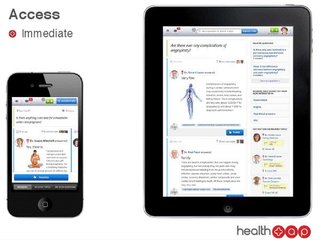Oxford Cancer Analytics raises $11M to detect lung cancer via a blood test
OXcan combines proteomics and artificial intelligence for early detection
Read more...
It’s pretty easy to say to someone, “you should probably see a doctor about that,” but health outcomes can vary widely depending on which doctor you see. I’m the type who does a buttload of Internet research on a doctor before scheduling an appointment—talking to friends, reading health grades, scouring Yelp reviews. My husband is the type who schedules an appointment with the nearest doctor who can see him at the time he wants.
But research has shown that patient outcomes are 30% better at academic and high-tech hospitals than the national average. To bring the industry’s best and brightest to the common folk, there’s Grand Rounds, a directory for the nation’s top doctors. The company announced Tuesday that it has raised $40 million in a Series B round led by Greylock Ventures, with participation from existing investors Venrock and Harrison Metal Capital.
The company also announced a new milestone: it now has over one million users.
The name "Grand Rounds" comes from a term in the medical community that started when Johns Hopkins doctors began gathering together to see a patient and discuss his or her case in 1889. From there, the term evolved to become an institution at every academic hospital. An invititation to deliver a grand rounds lecture at a teaching hospital is only afforded to the top physicians in the country.
The site’s Outcomes Management platform uses a proprietary algorithm to identify the country’s top physicians by a range of factors including training, publication history and patient outcomes. Grand Rounds’ doctors are affiliated with the top research hospitals (i.e. the Mayo Clinic, Johns Hopkins, Stanford, Harvard, etc.), they have published in “high-impact” journals and their research is considered 10 years ahead of the industry, and they come recommended by their own peers. Consequently, Grand Rounds’ algorithmic selection of doctors means that its network consists of the top 3% of physicians in the country. The specialists used for Grand Rounds’ Expert Opinion service are literally the top 0.1% of physicians.
There are some 1,000 specialists in the Expert Opinion service and several thousand more physicians in the Office Visits network.
Grand Rounds works by finding the nearest doctor in its network to patients. The Expert Opinion service is for more serious medical diagnoses, and in that case, the patient’s records will be sent to the appropriate expert, who will give his or her opinion on the case. Interestingly, an expert opinion through Grand Rounds will change an initial diagnosis or treatment 65% of the time, and patients can ask follow-up questions in perpetuity.
Patients pay $200 for an office visit and $7,500 for an expert opinion. It’s a pretty steep out-of-pocket expense without insurance, which is probably why Grand Rounds gets most of its users from enterprise customers—which is where it’s targeting its marketing campaigns. Jamba Juice recently joined as an enterprise customer earlier this year.
Founded in 2011, Grand Rounds has raised a total of $51 million to date. The company plans to use the capital to fuel growth to reach five million new members, along with R&D, sales and marketing, and building out its mobile capabilities.
OXcan combines proteomics and artificial intelligence for early detection
Read more...Nearly $265B in claims are denied every year because of the way they're coded
Read more...Most expect to see revenue rise, while also embracing technologies like generative AI
Read more...


